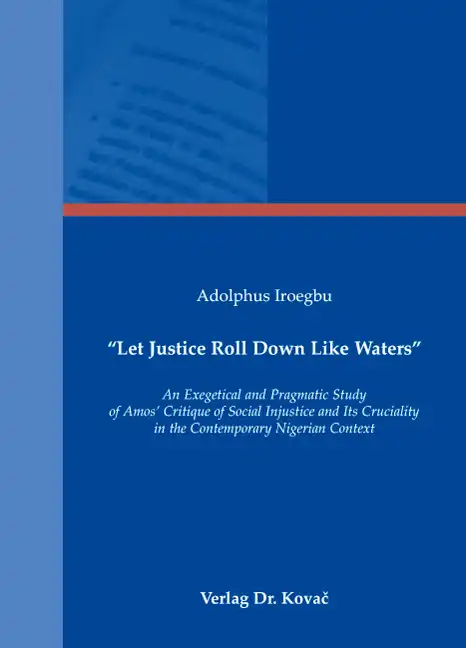Adolphus Iroegbu“Let Justice Roll Down Like Waters”
An Exegetical and Pragmatic Study of Amos‘ Critique of Social Injustice and Its Cruciality in the Contemporary Nigerian Context
THEOS – Studienreihe Theologische Forschungsergebnisse, Band 79
Hamburg 2007, 382 Seiten
ISBN 978-3-8300-3316-5 (Print) |ISBN 978-3-339-03316-1 (eBook)
Zum Inhalt
„Let Justice Roll Down Like Waters!? An Exegetical and Pragmatic Study of Amos’ Critique of Social Injustice and It’s Cruciality to Contemporary Nigerian Context, is an effort to relive Amos’ critique of social injustice in the society of today that are not so much different from Amos’. The book is calibrated into three major parts that are divided into seven chapters. Part one which has to do with the general introduction of the work consist of only chapter one. The second part of the dissertation, which is the major part, consisting of chapters two to five, centres on and deliberated on the social message of the prophecy of Amos. The last part is made up of chapters six to seven. The part deliberates on the situation in Nigeria and attempts to connect and utilise the social import of part two to Nigerian context. The dissertation deals chiefly with the message of Amos. The Prophet Amos was faced with problems that may be familiar to many of us especially in Nigeria. His primary concern was Justice. Israel was booming, its boundaries expanding, and things were looking good. Below the surface however, greed and injustice were festering and hypocritical religious motions had replaced true worship. His unflinching warnings about injustice and its effects were unpopular. He speaks about the prevalence of injustice in all nations with special concentration on Israel.
The title of the work: „?Let Justice Roll down Like Waters!’ An Exegetical and a Pragmatic Study of Amos’ Critique of Social Injustice and Its Cruciality to Contemporary Nigerian Context? is self-explanatory and it typifies handled in the book. It is born out of the semblance which the writer observes through the critical method in the society in which Amos lived and prophesied almost three thousand year ago and the present day Nigerian society. The economic exploitation which he indicted was made possible by corruption, abuse, and self-seeking power in the socio-political institutions of Israel. This is not strange in our society. The greed of judicial officials for wealth, the self-serving bias toward the powerful, and outright bribery which Amos observed and condemned stand to be condemned today in our nation. The corruption of leadership, the failure of those in leadership in their responsibility to serve justice and righteousness is in no less to be condemned among us today as in the days of Amos. Amos has harsh words for the excesses of a wealthy class that seeks its own luxury when social ills are obvious and widespread (Am. 4:1-3). The whole work is geared towards exploring the purpose and pragmatic importance of Amos’ message and the prediction for today’s Nigerian context.
Schlagworte
Corruption of leadershipCritique of Social InjusticeExegesisGerechtigkeitInjusticeInstitia SocialisJusticiaNigeriaProphet AmosSocial CritiqueSocial JusticeTheologieTheologyIhr Werk im Verlag Dr. Kovač

Möchten Sie Ihre wissenschaftliche Arbeit publizieren? Erfahren Sie mehr über unsere günstigen Konditionen und unseren Service für Autorinnen und Autoren.
